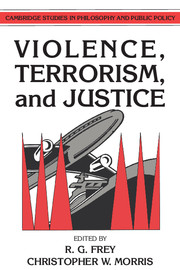Book contents
- Frontmatter
- Contents
- List of contributors
- Preface
- 1 Violence, terrorism, and justice
- 2 What purposes can “international terrorism” serve?
- 3 Violent demonstrations
- 4 Terrorism, rights, and political goals
- 5 The political significance of terrorism
- 6 Terrorism and morality
- 7 Which are the offers you can't refuse?
- 8 Making exceptions without abandoning the principle: or how a Kantian might think about terrorism
- 9 State and private; Red and White
- 10 State terrorism
- 11 Nuclear hostages
- 12 Rape as a terrorist institution
8 - Making exceptions without abandoning the principle: or how a Kantian might think about terrorism
Published online by Cambridge University Press: 05 June 2012
- Frontmatter
- Contents
- List of contributors
- Preface
- 1 Violence, terrorism, and justice
- 2 What purposes can “international terrorism” serve?
- 3 Violent demonstrations
- 4 Terrorism, rights, and political goals
- 5 The political significance of terrorism
- 6 Terrorism and morality
- 7 Which are the offers you can't refuse?
- 8 Making exceptions without abandoning the principle: or how a Kantian might think about terrorism
- 9 State and private; Red and White
- 10 State terrorism
- 11 Nuclear hostages
- 12 Rape as a terrorist institution
Summary
THE PROBLEM FOR KANTIANS AND THE LARGER ISSUE
Terrorism poses a practical problem that is urgent and difficult. How, within the bounds of conscience, can we respond effectively to violent terrorist activities and threats, especially given the ideological fanaticism and nonnegotiable demands that typically accompany them? The problem is partly instrumental and partly moral. The instrumental task is to find, among the morally permissible means, the best way to minimize terrorist violence, taking into account our other goals and values. The moral task is to determine what means of response are morally permissible. I shall focus here on this second problem, or rather on one way of thinking about it.
Terrorists, of course, often claim that their ends are morally worthy and that their means are morally justified in the context. Some of these claims deserve a serious hearing, and even the more outrageous claims can pose challenges that moral philosophers should not ignore. For present purposes, however, I shall simply assume that terrorism is morally indefensible, at least in the cases to be considered; and I will not be discussing why this is so. My inquiry, instead, is about what responses are permissible when terrorists immorally threaten the lives of innocent hostages.
Even this somewhat more limited question is too large to undertake here. To give an adequate answer would require us not only to resolve deep issues in moral theory but also to investigate relevant matters of fact, make careful distinctions among cases, review our moral judgments regarding similar problems, and so on.
- Type
- Chapter
- Information
- Violence, Terrorism, and Justice , pp. 196 - 229Publisher: Cambridge University PressPrint publication year: 1991
- 3
- Cited by



